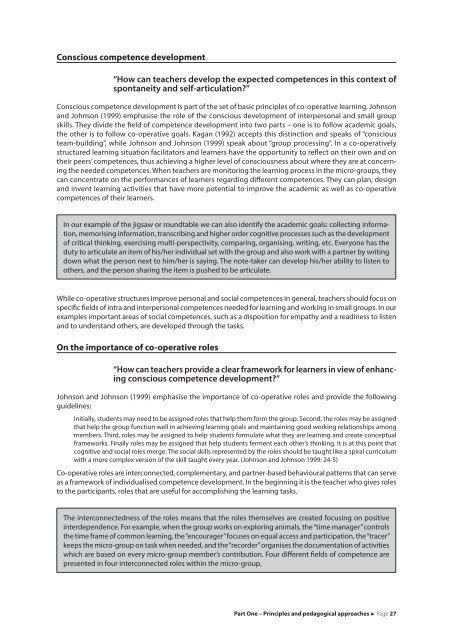TASKs for democracy
4NYw4W
4NYw4W
Create successful ePaper yourself
Turn your PDF publications into a flip-book with our unique Google optimized e-Paper software.
Conscious competence development<br />
“How can teachers develop the expected competences in this context of<br />
spontaneity and self-articulation?”<br />
Conscious competence development is part of the set of basic principles of co-operative learning. Johnson<br />
and Johnson (1999) emphasise the role of the conscious development of interpersonal and small group<br />
skills. They divide the field of competence development into two parts – one is to follow academic goals,<br />
the other is to follow co-operative goals. Kagan (1992) accepts this distinction and speaks of “conscious<br />
team-building”, while Johnson and Johnson (1999) speak about “group processing”. In a co-operatively<br />
structured learning situation facilitators and learners have the opportunity to reflect on their own and on<br />
their peers’ competences, thus achieving a higher level of consciousness about where they are at concerning<br />
the needed competences. When teachers are monitoring the learning process in the micro-groups, they<br />
can concentrate on the per<strong>for</strong>mances of learners regarding different competences. They can plan, design<br />
and invent learning activities that have more potential to improve the academic as well as co-operative<br />
competences of their learners.<br />
In our example of the jigsaw or roundtable we can also identify the academic goals: collecting in<strong>for</strong>mation,<br />
memorising in<strong>for</strong>mation, transcribing and higher order cognitive processes such as the development<br />
of critical thinking, exercising multi-perspectivity, comparing, organising, writing, etc. Everyone has the<br />
duty to articulate an item of his/her individual set with the group and also work with a partner by writing<br />
down what the person next to him/her is saying. The note-taker can develop his/her ability to listen to<br />
others, and the person sharing the item is pushed to be articulate.<br />
While co-operative structures improve personal and social competences in general, teachers should focus on<br />
specific fields of intra and interpersonal competences needed <strong>for</strong> learning and working in small groups. In our<br />
examples important areas of social competences, such as a disposition <strong>for</strong> empathy and a readiness to listen<br />
and to understand others, are developed through the tasks.<br />
On the importance of co-operative roles<br />
“How can teachers provide a clear framework <strong>for</strong> learners in view of enhancing<br />
conscious competence development?”<br />
Johnson and Johnson (1999) emphasise the importance of co-operative roles and provide the following<br />
guidelines:<br />
Initially, students may need to be assigned roles that help them <strong>for</strong>m the group. Second, the roles may be assigned<br />
that help the group function well in achieving learning goals and maintaining good working relationships among<br />
members. Third, roles may be assigned to help students <strong>for</strong>mulate what they are learning and create conceptual<br />
frameworks. Finally roles may be assigned that help students ferment each other’s thinking. It is at this point that<br />
cognitive and social roles merge. The social skills represented by the roles should be taught like a spiral curriculum<br />
with a more complex version of the skill taught every year. (Johnson and Johnson 1999: 24-5)<br />
Co-operative roles are interconnected, complementary, and partner-based behavioural patterns that can serve<br />
as a framework of individualised competence development. In the beginning it is the teacher who gives roles<br />
to the participants, roles that are useful <strong>for</strong> accomplishing the learning tasks.<br />
The interconnectedness of the roles means that the roles themselves are created focusing on positive<br />
interdependence. For example, when the group works on exploring animals, the “time manager” controls<br />
the time frame of common learning, the “encourager” focuses on equal access and participation, the “tracer”<br />
keeps the micro-group on task when needed, and the “recorder” organises the documentation of activities<br />
which are based on every micro-group member’s contribution. Four different fields of competence are<br />
presented in four interconnected roles within the micro-group.<br />
Part One – Principles and pedagogical approaches Page 27


